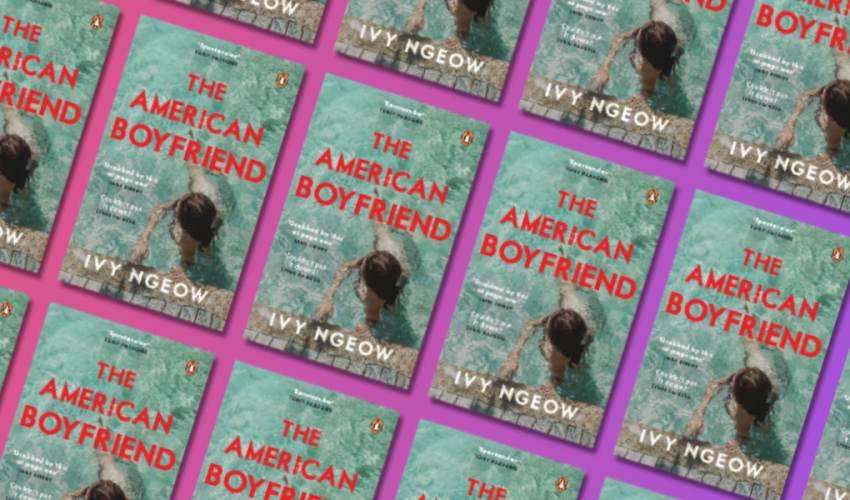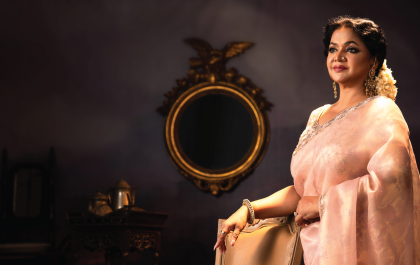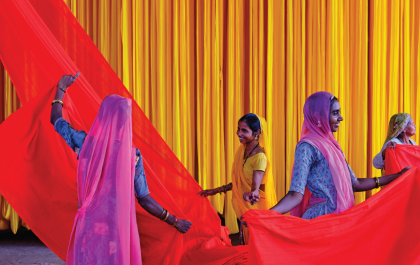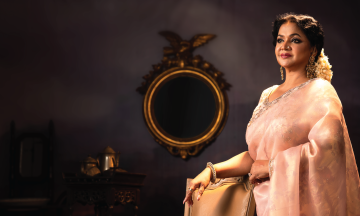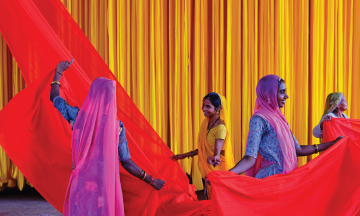Ivy Ngeow discusses her exciting thriller in this exclusive interview with MWB
By Usraat Fahmidah
In Ivy Ngeow’s The American Boyfriend, we follow the journey of Phoebe Wong, a 43-year-old single mother, as she travels to Florida to meet her long-distance boyfriend, Carter, whom she surprisingly connected with on LinkedIn, of all social platforms. Her teething toddler, JoJo, accompanies her on this adventure. However, her plans take an unforeseen turn when she discovers that her boyfriend’s arrival is delayed, leaving her and her daughter alone in his Key West vacation home.
At a BBQ party, she crosses paths with a British expatriate businessman. Eventually, her boyfriend arrives, apologetic and offers to treat her to dinner. The story takes a dark and mysterious turn when the same British expatriate is shot that very night in the restaurant’s car park. Phoebe finds herself ensnared in a mysterious web, raising suspicions about the timing of her boyfriend’s delayed arrival.
As the story unfolds, Phoebe and her daughter become entangled in a series of dangerous events, and the one person she considered reliable – her American boyfriend – suddenly appears untrustworthy.
With its thrilling plot twists and a suspenseful premise, The American Boyfriend makes for the perfect binge-worthy weekend read.
This month, I sat down with author Ivy Ngeow to discuss her book and more.

Can you share with our readers an overview of your novel The American Boyfriend without revealing any plot spoilers?
When a single mum’s long-distance boyfriend in New York invites her to meet him in Florida, she couldn’t wait. Robbed on her first night, she is now trapped in a messy murder case.
How and when did the idea for The American Boyfriend come to you?
I was on a flight once and I saw a woman looking out of the aircraft window just after the plane landed and the fasten seatbelt signs were off. She looked very perturbed and tired. A toddler was climbing all over her lap and shoulders like she was furniture and it hardly bothered her. I began to wonder why people travel abroad, was she alone and where was she heading? Who was meeting her? The idea came to me that I wanted to explore a story about a modern woman who travels, a mum, and someone who might be troubled.
Your debut novel, Cry of the Flying Rhino, received the International Proverse Prize in Hong Kong and is set in 1996 Malaysia and Borneo, featuring multiple perspectives and voices. Your most recent work, The American Boyfriend, offers readers a thrilling summer read set in Florida. That is to say, your body of work showcases an impressive range of story-telling. How would you say your journey as a writer evolved over the course of your career, and what initially sparked your passion for writing?
After I won and went to Hong Kong as a family to receive the prize, I felt very validated and valued. As writers, we never know that what we write will end up anywhere or if it will even be finished. It takes a lot of courage, endurance, faith, and, maybe, madness too. It’s a bit scary as you always start with an empty page. My writing journey has taught me that we are not alone. Without the support, patience, and encouragement from my family and friends, all of whom are my readers too, I don’t know if I could keep going. Some days you will bleed words, other days you will feel alone and beaten, like you’ve hit a blank wall and that there are no more words. Someone shows you a little kindness, and eventually you recover, turn away from the blank wall, and the stories come.
I have always wanted to break the barriers of race, religion, and class in my writing. I wrote the books that I wanted to read because I constantly challenge the stereotypes and societal norms. I feel there is not enough representation of the world we now live in. I wanted to write about the modern Asian woman and to hear her voice. My themes of immigration, cultural identity, and displacement are natural seedbeds of conflict. In both my debut and my latest, I am also a bit of a risk-taker in that sense. I wrote not only about my adventurous characters, I also had an adventure writing these books. I wanted to create worlds that we wanted to escape to, or from, with a sense of peril that tests the characters’ resilience.
The prize taught me five things: diverse representation matters, hard work pays off, the hundreds of crushing rejections made me the writer I am, finding your voice takes a long time, and finally, top quality writing will always stand out. With each book, my aim had always been to write the best book that I could write. To say that winning a prize hasn’t changed me is like saying having children hasn’t changed me. Of course it has. I began, as everyone does, an amateur and dabbler, but now I feel I have reached a professional level of writing.
As a girl, I had not planned on writing. I always saw myself more as a communicator or story-teller. I had always been musical and enjoyed performing and improvising. I had grown up with stories, via my mum, my aunts, my grandparents, my dad, my teachers. I enjoyed hearing them so much that I also began telling them. I made up stories for my toddler brothers to entertain them before they could read. I could also read stories to them as I was far older than them. I changed the endings, improvised stories which came from books, or began “making up stories” and “re-telling” stories which I thought required “improving.”
I had no idea it was fiction. I saw story-telling simply as a way of expressing myself. Later when I could write them down, I really enjoyed the world I was creating, one that was simply “made up.” These early years of informal narratives, expressions of thoughts, words and diagrams, were the beginning of what I now know as “writing.”
Are there any authors or books that have influenced your writing style or inspired you as a writer?
When I was growing up I enjoyed Daphne du Maurier, George Orwell, and Ernest Hemingway. As a young adult I read JM Coetzee, Muriel Spark, and F Scott Fitzgerald. More recently, I have been a fan of Shari Lapena, Jennifer Hillier, and Jeneva Rose.
Having published five novels along with numerous short stories and a short story collection, can you give us some insights into your writing process? Do you have any specific routines or habits that help you stay productive and creative as a writer?
Writing is a creative process, and therefore it requires a profound focus and an urge to constantly form and develop ideas. For me, the most important motivation is the idea. This means finding the right book to write. It’s a must as you will be spending a lot of time writing your book. 80% of my writing is developing the concept. This is an initial stage but it could take me weeks, months or even years as it did my first novel. Now I would not hesitate to discard bad ideas. I would only develop a very strong idea or hook. This is an elimination process that could possibly be heartbreaking if you’ve fallen in love with an idea which is weak, but it takes experience and gut instinct to recognize and wrench out the right book to write. I know that sounds so visceral, but writing for me is like wrestling and pulling out of a wreckage something so brilliant that you can’t help but write it.
During the ideas or concept stage, I make reading a part of writing. Books are brain food so if I am not reading, I would not be writing. Once I have my concept, it is a question of writing by hand, and drawing diagrams to make sure the story flows. I try to sketch each scene loosely. That would form my zero draft. It would be coarse and lumpen, but no matter, the zero draft is probably the most important. The first draft is just “typing.” The concept is refined over and over (“retyped and retyped”) until I have possibly the third or fourth draft. The only time I would start any editing is when I am happy with the structure. Editing is like painting, decorating, cleaning, furnishing and tidying a messy house but the house must already be a complete and stable entity even if it is still a bit rough.

To stay productive, I tend to keep my fitness up so that I can be mentally healthy and alert. I also would recommend setting monthly goals either in time spent on writing or word count. Next, I use well-known tools like using a timer and a spreadsheet when I write and to always record my word count even if I had written zero words. We all have the same 24 hours. You can’t make more time. The only way you will have time to write is to have time to write.
What exciting projects or themes can readers expect from your future work?
I have started writing a novel about an Asian family in London. I can’t say anymore except the fact that it will have a mind-blowing twist! I am also planning to work on more short fiction to submit as my short story muscle has been out of practice for some time and I miss using it.
What advice do you have for aspiring authors who are working on their first novels or looking to enter the world of writing and publishing?
Keep reading and writing (if you love it). If you do both you will vastly and quickly improve. You will learn by doing. It’s a skill, an art, a craft, a habit, and yes, a madness. Anyone can start a novel but to end it is a real test of one’s patience, endurance and passion. If you have started then you should set a goal to finish it using the usual tools of the word count journal (or spreadsheet), timer, and timetable. But all of this advice won’t work if you don’t love reading and writing. The only thing that will help you start, write, and finish a novel is the unending, senseless, and overwhelming love for writing.




